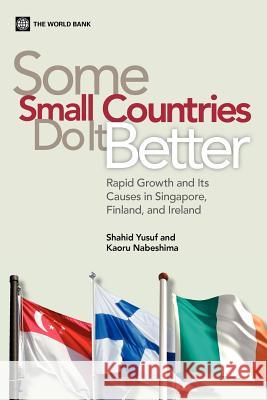Some Small Countries Do It Better: Rapid Growth and Its Causes in Singapore, Finland, and Ireland » książka
Some Small Countries Do It Better: Rapid Growth and Its Causes in Singapore, Finland, and Ireland
ISBN-13: 9780821388464 / Angielski / Miękka / 2012 / 152 str.
Countries worldwide are struggling to imitate the industrial prowess of the East Asian pacesetters, but growth accelerations have proven remarkably transient. Building a portfolio of tradable goods and services and steadily raising the level of investment in these activities, has generally defied the best policy efforts - in particular, bringing investment ratios on par with East Asian averages has presented the greatest challenge. Hence the search is on for growth recipes not so tightly bound to investment, to manufacturing activities, and to the export of manufactured products. In casting around for such recipes validated by demonstrated results, the experience of economies which have relied more on other drivers of growth - human capital and knowledge - is highly attractive. Finland and Ireland are among the tiny band of small nations that grew rapidly for well over a decade by achieving the maximum mileage from an adequate investment in physical assets and by harnessing the potential of human capital and technologies. Singapore combined high investment with a comprehensive and complementary strategy of building high quality human and knowledge assets. This approach enabled the three countries to diversify much faster into higher tech manufactures and tradable services and profit from globalization. The approach adopted by these three countries may be of greater relevance in the highly competitive global environment of the early 21st century because it does not necessarily assume heroic levels of investment. Moreover, it may be better tailored to the opportunities for middle and lower middle income economies threatened by the middle income trap and seeking growth rates in the 6 percent range, and for the smaller, late starting, low income countries with youthful, rapidly increasing populations that need to grow at high single digit rates in order to create enough jobs and to double per capita incomes in 10 years.











